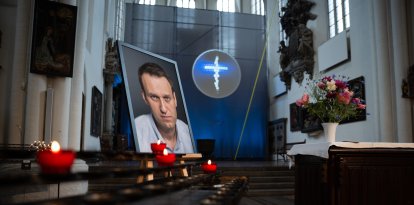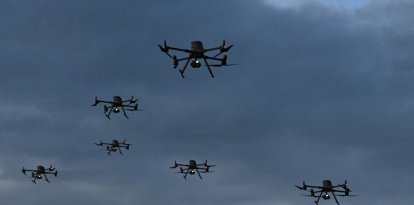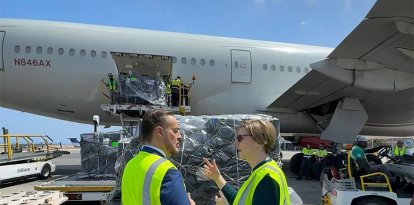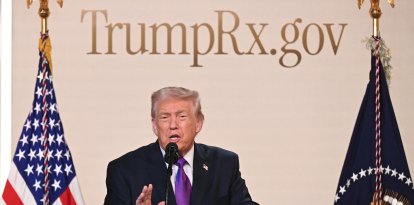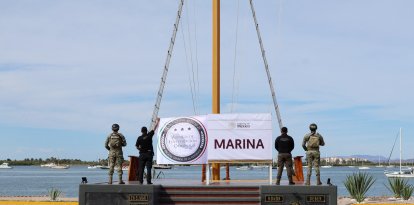The United States, Ukraine and their European allies propose a truce to Russia starting on Monday
Emmanuel Macron, Friederich Merz, Keir Starmer and Donald Tusk traveled to Kiev to meet with Zelensky. From there, they held a direct conversation with Donald Trump.

Top European leaders with Zelensky in Kiev.
Ukraine, the United States and Kiev's European allies on Saturday proposed a "full and unconditional" 30-day ceasefire to Russia beginning Monday.
The leaders of Germany, France, Poland and the United Kingdom met this Saturday in Kiev with Ukrainian President Volodymyr Zelensky, to show their support for Ukraine. From there, they held a direct conversation with Donald Trump.
"Ukraine and all allies are ready for a full unconditional ceasefire on land, air, and at sea for at least 30 days starting already on Monday," Ukrainian Foreign Minister Andrii Sybiha said on X.
Ukraine has already made this proposal several times in recent weeks, but Russia has consistently rejected it, arguing that Russian demands must first be met, in particular an end to Western arms deliveries to Kiev.
Sybiha noted that the 30-day truce could "pave the way to peace negotiations" in the conflict that began on Feb. 24, 2022, with the Russian invasion of Ukraine.
Zelensky and his four European allies had a "fruitful" telephone conversation with U.S. President Donald Trump after their meeting the Ukrainian capital, the Ukrainian foreign minister said. Trump on Thursday urged Moscow to accept a 30-day truce.
The initiative also received the support of European Commission President Ursula von der Leyen, who estimated on Saturday in X that the truce "must be implemented without preconditions to pave the way for meaningful peace negotiations."
French President Emmanuel Macron, German Chancellor Friedrich Merz and von der Leyen threatened to tighten sanctions against Russia if Moscow does not accept the truce.
Macron called for "direct discussions" between Ukraine and Russia in case of ceasefire.
On his side, in an interview with German newspaper Bild, Merz threatened Moscow with "massive tightening of sanctions" if Putin rejects the truce demanded by Europeans and Americans, and promised that "massive aid" to Ukraine will continue in the absence of a reaction from the Kremlin.
Moscow's condition
The European leaders met with the Ukrainian president at Maidan Square in central Kiev, where they observed a minute of silence before a memorial to fallen soldiers since the start of the Russian invasion of Ukraine in February 2022.
They also participated in a virtual meeting with the "coalition of the willing," composed of countries supporting Ukraine and led by London and Paris, to discuss "security guarantees" for Ukraine in the event of a truce.
The European leaders' visit to Kiev is a symbolic response to the lavish celebrations the day before in Moscow for the 80th anniversary of the victory over Nazi Germany, in the presence of several foreign leaders, including China's Xi Jinping.
In Moscow's Red Square, Russian President Vladimir Putin on Friday paid tribute to soldiers deployed in Ukraine for "their bravery" in the worst armed conflict in Europe since World War II, which has claimed tens of thousands of lives in each country.
In an interview with U.S. television channel ABC, Kremlin spokesman Dmitry Peskov said Russia will not agree to a ceasefire unless Western countries' arms shipments to Ukraine are stopped first.
Otherwise, a truce would be "an advantage for Ukraine" at a time when "Russian troops are advancing" on the frontline, Peskov said.
U.S. warning
Ukraine has reported no Russian long-range missile strikes on its cities since the start of a unilateral three-day truce decreed by Russia this week, but accused Moscow of hundreds of violations on the front line.
The U.S. embassy in Ukraine warned on Friday against the risk of a heavy Russian "air strike" in the coming days.
Ukrainian media claimed Saturday that Russia had given notice to close airspace over its military site used for the 2024 launch of its state-of-the-art Oreshnik missile, a potential sign of preparation for a new attack.
Since Donald Trump's return to the White House in January, and the start of his rapprochement with Putin, Ukrainians and Europeans have feared that a deal would be concluded without their consent.
However they now hope they have managed to tune in to the U.S. president, especially since a face-to-face meeting between Trump and Zelensky in Rome on the occasion of Pope Francis' funeral on April 26.












